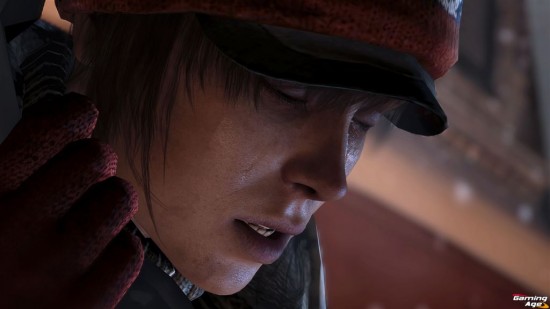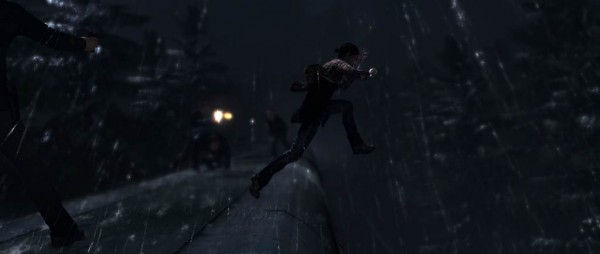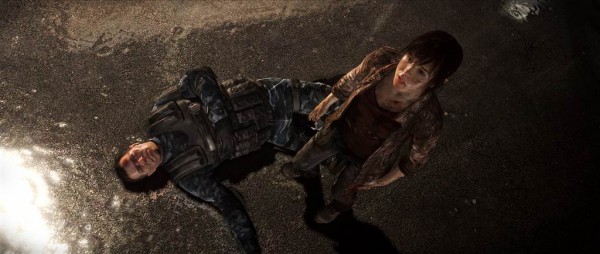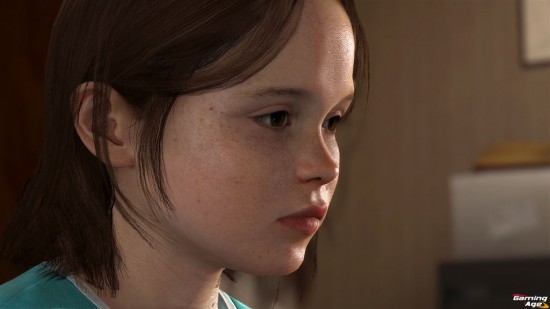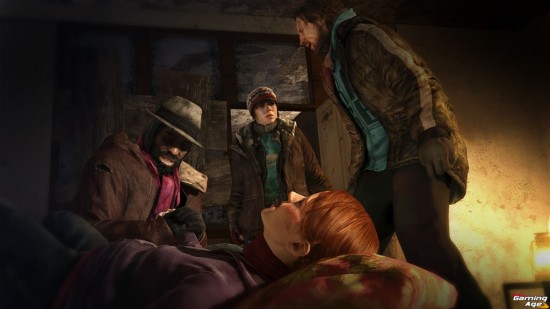Publisher: SCEA
Developer: Quantic Dream
Medium: Blu-ray Disc
Players: 1-2 (local)
ESRB: M
In an era dominated by first person shooters, open world sandboxes and yearly sports titles, Quantic Dream isn’t afraid to take risks when it comes to designing video games. For its time, Indigo Prophecy was a unique and story-driven experience for the PlayStation 2 which offered us a glimpse at the studio’s grand vision. They followed up with Heavy Rain, a PS3 title which not only exceeded retail and critical expectations, but also successfully redefined what could be categorized as “interactive drama”. Beyond: Two Souls, also for the PS3, makes an attempt at combining everything that the studio has learned over the past two generations into one Hollywood talent-infused blockbuster of a project. The end result has emotion and drama to spare, even though it lacks focus and the promised interactivity at times.
It’s nearly impossible to discuss Beyond: Two Souls and not compare it to Heavy Rain. Both games are often stunning looking, performance captured, interactive adventures loaded with voice work and intriguing motion picture-style scripts. One of the main complaints levied against Heavy Rain was the odd, often stilted voice work due to a few non-native English speaking actors assuming the role of main characters. I was able to look past the sometimes unintentionally amusing voiceovers and still appreciate the game for what it was, even after the “press X for Jason!” meme that made the rounds afterwards. For Beyond: Two Souls, Sony and Quantic Dream tapped into the talents of Ellen Page, Willem Dafoe and Kadeem Hardison among others to flesh out the characters and help bring the script to life. When compared with Heavy Rain, having TV and movie actors provide voice and motion capture for the game does make a difference — as unlikely a trio as they are.
As one might expect from an interactive drama, Beyond: Two Souls is an entirely story-driven adventure, with gameplay often designed around the plot instead of the other way around. The story is a different one to say the least, blending a little bit of the paranormal themes of Indigo Prophecy with the more emotional and intense scenarios as found in Heavy Rain. Of course there is a mild horror element in the game as well, and there is a handful of scenes designed to make players feel a little uncomfortable and on edge.
In Beyond: Two Souls, you assume the role of a gifted girl by the name of Jodie Holmes (Ellen Page) over a period of 15 years of her life, roughly covering ages 8 – 23. Gifted, in Jodie’s case, means she is tethered to a supernatural entity named Aiden with whom she can speak, interact with and take control of for a short time. The abilities she gains by being paired with Aiden offers the impression that Jodie has psychic and telekinetic powers, which is a gift that the Government, who has had their eye on Jodie since birth, is extremely interested in. These powers (of course) come with a curse, and Jodie is haunted by what appears to be evil entities or souls from another plane of existence that she must occasionally deal with.
The story in Beyond: Two Souls doesn’t take place sequentially, instead it leaps around to different events in Jodie’s life — from a cute eight year old girl playing with her toys and watching TV, to a confident and weary young adult and many other stages in between. Throughout this time frame her family, friends and living situation change frequently, and she is shuttled between adoptive parents and military bases, research facilities and swanky apartments. As Jodie, we take control of many of the choices and actions she makes in her quest to discover who (or what) she is and to define the purpose of her own life. Like her supernatural partner Aiden, we?re along for the ride.
Heavy Rain had a fair share of gamers who weren’t crazy about the QTE (quick time event) oriented control scheme and tank like character movements even though they knew what they were getting into. Beyond: Two Souls relies on a more direct-action approach to moving Jodie and Aiden about the environment, but that’s not to say that Quantic Dream ditched QTEs and button combinations. On the contrary, they still exist for character and environmental interaction and action-heavy scenes, albeit in streamlined fashion with less prompts. Simple, menial tasks throughout the game such as opening a door just requires a movement towards the object (using a dot as a prompt) instead of a complex, multi-part turning motion for example. There are definitely action sequences that will test your finger dexterity, flexibility and timing, just not in a way that is altogether annoying for those who aren’t fans of these QTEs. Quantic Dream somehow found a way to work some military shooting action and stealth into Beyond, though the controls are still primarily context sensitive. Controlling Aiden in three-dimensional space and using his powers to interact with objects, attack, harass or take control of characters is an entirely different experience and more “game-like” in comparison.
The only gameplay issues that stick out are the prompt-less, slow-motion action scenes that require you to pay attention to Jodie’s movements and follow through with the correct direction. Even in slow motion, the required movement isn’t immediately apparent at times, and while you can’t really ?fail? because of this, it can be a little irritating at times to feel like you?re doing something wrong and not know why.
Beyond: Two Souls is an amazing looking PS3 title for sure, and in regard to the character faces in particular, one that teeters on the edge of the uncanny valley with eerily real looking eyes, skin, hair and facial animations. The high quality performance captured animations are in full effect and it’s especially impressive that they are being rendered in real-time on the PS3. On that note, you can tell that Quantic Dream spent a good chunk of their visual performance budget on the characters since a few of the larger, brighter environments feel somewhat sterile at times with flat lighting and more obviously compressed textures. The overall package is still extremely attractive and there is more than enough eye candy to satisfy those who demand it. The incredible ending sequences alone make up for any visual deficiencies that pop up from time to time. Regardless, the performance captured character models really steal the show in Beyond: Two Souls.
As mentioned earlier, the voice work in Beyond: Two Souls is a quantum leap in quality over what we experienced in Heavy Rain, and Ellen Page’s emotional delivery most certainly brings Jodie’s character to life. From her awkward and shy teenage years to a legitimately pissed off adult, Jodie comes across as a character that players can identify with. The supporting cast including Willem Dafoe as Nathan Dawkins and Kadeem Hardison as Cole hold their own, though it is Ellen Page?s performance that clearly stands out. Lorne Balfe’s dramatic soundtrack is beautiful as expected, and the score adapts to the high energy action scenes and the quiet, expressive moments nicely.
With the way the game jumps from event to event during Jodie’s life, the pacing also feels like it?s a little bit all over the place at times. There are chapters where you may spend 10 minutes preparing a meal, performing menial tasks or conversing with a character, and then follow up with one that may take a half an hour or more and are full of action sequences and exploring. Additionally, other than finding the correct interactive objects within your environment to trigger a scene, Beyond is surprisingly light on puzzle solving as compared to Heavy Rain. Some of the slower-paced scenes (usually those with a lot of interactive dialog) can drag on for a while and seemingly add nothing to the overall story.
The game presents Jodie with a few of what seems like significant choices and actions during a number of scenes, and depending on the decisions made or actions performed, these scenes and the storyline branch out to an extent. The branching appears more organic and less obvious than it did in Heavy Rain, and it’s difficult to infer how an alternative scenario may play out unless you revisit a chapter and try for yourself. I often found myself wondering what the outcome would be if I were more evasive when speaking with characters, didn’t miss a button prompt or decided not to be as aggressive with Aiden. As the game draws to a conclusion, there are an obvious handful of decisions which clearly have a greater weight than some of those which happen earlier on.
Beyond: Two Souls isn’t particularly difficult and there?s never a ?game over? screen per se, so it should take an average player around 10-12 hours or so to get through the game’s normal mode. For those not adept at using a controller or dealing with action sequences, Quantic Dream put together an easy mode for those “who don’t play video games frequently” and also released an iOS and Android controller app known as Beyond Touch, which is already available on the App Store and Google Play. Beyond Touch effortlessly syncs (via Wi-Fi) to the PS3 if it’s on the same local network as your console and is a more casual way to play through the game as a single player or with a second player as Aiden. From my experience with installing and using the Android app on my Nexus 7 it worked exactly as advertised. It’s a pretty neat feature and one that will probably be commonplace on next generation consoles.
Beyond: Two Souls is a tricky game to grade, in part because there are times where it doesn’t feel like a game at all. Even though it was lacking decent voice actors and the QTE scenes were often overly complex at times, I found Heavy Rain to be a more original experience overall due to an actual mystery to solve and more unique interactivity. Beyond: Two Souls is usually so laser focused on telling the story of Jodie?s life and how she copes with her gift that I sometimes found myself just going through the motions to push the narrative along. Don?t get me wrong, the game tells an interesting and emotional story, and the acting is top notch, but it does aimlessly plod along here and there. Thankfully, Quantic Dream ensured that Beyond: Two Souls would wrap up in an amazing, thought-provoking way which does make the ride very much worth taking.


